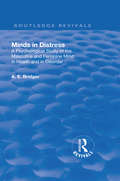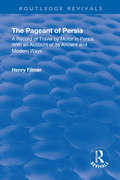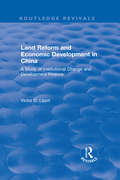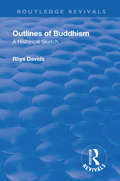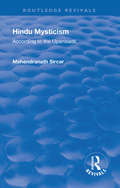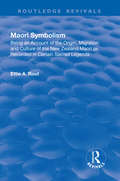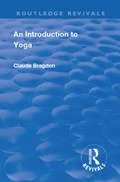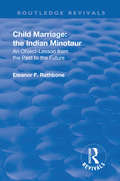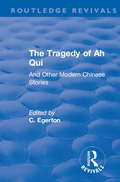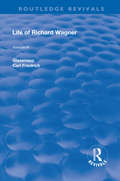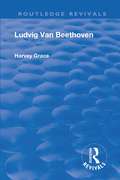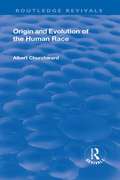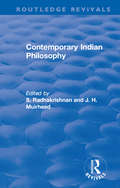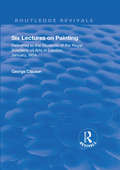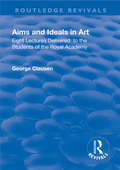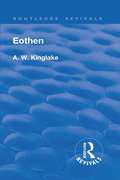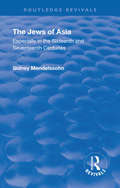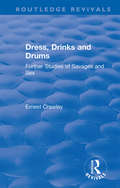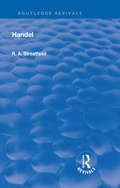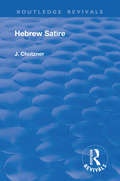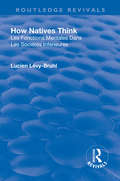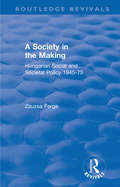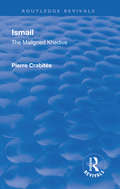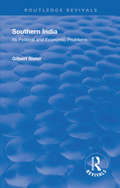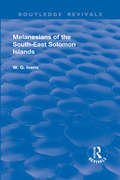- Table View
- List View
Revival: A Psychological Study of the Masculine and Feminine Mind in Health and in Disorder (Routledge Revivals)
by Adolphus Edward BridgerThere are two points from which humanity may be viewed, the bodily and the mental. Hitherto, and for various reasons, medicine has concerned itself almost solely with the physical side of man. The result has been disappointing, for, necessary as it is to be acquainted with the bodily structure in health and in disease, the changes that occur in the latter only represent the physical results of a process, and not the means by which the damage is done. Now the duty of the physician is like that of the pilot; to bring his patient safely into port, availing himself of every agency with that one object in view. Therefore, Mind, in the fullest and widest sense, must be one of his chief studies.
Revival: A Record of Travel by Motor in Persia with an Account of its Ancient and Modern Ways (Routledge Revivals)
by Henry FilmerIt is the dawn of history and of the dispersion of the Indo-European peoples. They are breaking their tents in central Asia along the Hindu Kush and the Pamirs, primitive Aryans with their dogs and their herds of domesticated animals. In their trek they will proceed to the farthest confines of Europe. From them the peoples of England, France, Germany, Italy, Spain, Scandinavia, Russia, Greece and other will take their origin. A part will penetrate into India and another portion into Persia. They will build empires and munitions factories, cathedrals and cabarets. Some less simple-minded, the Kurds, Lurs and Bakhtiaris will maintain in Persia their primitive character into the twentieth century. With them in their dispersion, the Aryans carry the sacred fire which they have worshiped since they became acquainted with its use. It was man's first great step in the mastery of nature. The memory of its aid will be consecrated in one of the World's great religions; its flame will never be extinguised on the great Iranian plateau, the museums of religions.
Revival: A Study Of Institutional Change And Development Finance (Routledge Revivals)
by Victor D LippitThis title was first published in 1975: The question of development finance in underdeveloped countries is ultimately one of the use of the surplus: how can a significant part of that share of national income above a nation's culturally determined subsistence requirem ents be channeled into investment ? In every society an elaborate system of claims on the surplus exists, whether as a m aterial expression of the fealty owed to elders and chiefs in tribal society or the rent, interest, and profits due the owners of capital in capitalist society. Part of a revivals collection.
Revival: A historical sketch (Routledge Revivals)
by Rhys DavidsThis book discusses what is now called "Buddhism". It started as an effort to strengthen a weak point in that "immanence" which had become the accepted religious teaching in the valley of the Ganges, by showing that the "God/in/man" was realizable, not by gnosis and ritual, but in conduct. Conduct needed to be brought into relgion, into the relation between man and his eternal destiny. Man’s being is more truly becoming; and only in and by becoming a More, will he attain to an actual, not potential Most. In teaching a More worth in conduction, Buddhism brought in a teaching of the man himself as Less.
Revival: According to the Upanisads (Routledge Revivals)
by Mahendranath SircarHindu Mysticism provides an engaging introduction to the various mystical traditions that evolved over the centuries in India, including the sacrificial (Vedic), Upanishadic, Yogic, Buddhist, Classical Bhakti (Devotional) and Popular Bhakti. Given its sweeping scope, the text also serves as a useful overview to Indian thought for newcomers to this ancient philosophical and spiritual tradition.
Revival: An Account of the Origin, Migration and Culture of the New Zealand Maori (Routledge Revivals)
by Ettie A. Rout‘Maori Symbolism’ is a story of a great race as told in their own Sacred Legends. And it is even more than this. It is an accurate record of the inner meaning of Life Symbolism on which the civilization of the Dark-Whites all over the world is founded. That symbolism stands for Cultivation – of the race, of the body and of the land. The numerous illustrations are to be regarded as documents supporting the evidence reported in the text. Some of this is of startling interest, as for insurance that concerning the casting of ancient statues and megaliths from molten lava. The Sacred Legends concerning the origin and migration of the New Zealand Maori are reported at some length, and the evidence given throws fresh light on the important ‘Diffusion’ controversy. Maori land cultivation is shown to have been far in advance of European. Maori cultivation of the body, expressed in native dances, is demonstrated to be an ordered system of physical education, designed to improve and preserve the fittest. Maori race culture is exhibited as based on a lofty code of social and sexual ethics. Maori religion and philosophy, as expressed in symbolic decoration and writing, are for the first time truthfully explained and interpreted.
Revival: An Introduction to Yoga (Routledge Revivals)
by Claude BragdonAccount of the origins, history and practice of Yoga from the viewpoint of someone who is learned, but is not himself a practicioner.
Revival: An Object-Lesson From the Past to the Future (Routledge Revivals)
by Eleanor F. RathboneThe newly issued Indian Census Report for 1931 contains many disquieting revelations, but none more so than the huge increase in child marriage and the continuing enormous mortality of women due to premature maternity, bad midwifery, purdah and kindred social evils. The first part of this book exposes the futility of the steps hitherto taken to cope with child marriage. The second part discusses remedies. Wider voting rights and a larger share in administration are claimed for women, and women themselves are urged to take up the Government’s challenge, "Educate public opinion," by organising an extensive campaign of propaganda and resistance to those who break the law prohibiting child marriage. The book has a direct bearing on the problem of India’s future Constitution and contains new material concerning other problems besides that of child marriage.
Revival: And Other Modern Chinese Stories (Routledge Revivals)
by C. EgertonShort stories translated from the Chinese by J.B. Kyn Yn Yu and from the French by E.H.F. Mills
Revival: Art and Politics (Routledge Revivals)
by Carl Francis GlasenappFourth volume of Carl Francis Glasenapp's Life of Richard Wagner.
Revival: Beethoven (1933) (Routledge Revivals)
by Harvey GraceThe original intention was that this book should be entirely biographical. If it be true, however, that out main interest is (or ought to be) in what a composer did rather than in what he was, the truth applies especially to Beethoven, and above all at the present time. The scheme of the book has therefore been modified so as to include a survey of his work. An attempt to make such survey cover the whole of Beethoven’s output would result in little more than a catalogue, with annotations to brief as to convey hardly anything of the essential quality of the music. It seemed, therefore, that the limited space would be best used, and the needs of the general reader more fully met, by a much less rigid and comprehensive method. My aim has been to indicate some, at least, of the more important characteristics of Beethoven’s works, and to show their influence on his successors.
Revival: Connected With The Origin And Evolution Of The Human Race (Routledge Revivals)
by Albert ChurchwoodWhere and when did man make his first appearance on this earth? The object of this book is to bring before the public such further facts and values regarding the evolution of man. After studies Churchwood made during many years, he is now fully convinced that the hitherto preconceived ideas of many scientists regarding the origin of the human race, both as to place and date, are erroneous, and evidence will be brought forward to prove that the human race did not originate in Asia, but in Africa.
Revival: Contemporary Indian Philosophy (Routledge Revivals)
by S. RADHAKRISHNAN AND J. H. MUIRHEADThe book includes essay which are all written by philosophers of or about forty -five years of age. They fall into two main groups: those in which the writer devotes himself chiefly to the exposition of the great Vedic tradition as he has apprehended it and made it the basis of his own life’s work; and those in which the writer, while on the whole remining true to the spirit of that tradition, has sought to give new interpretations of it, either by instituting comparisons of it with the Western doctrines most closely allied to it or by treating of modern problems in a way which, though suggested by what he has learned from the West, is yet stamped with the mark of his own racial sympathy. Western readers will naturally find the latter group more attractive; but this volume will have failed of its purpose if it does not give them some sense of the truth that underlies even the essays with which, owing to the presuppositions ion which these are founded, they find themselves least in sympathy.
Revival: Delivered to the Students of the Royal Academy of Arts in London, January 1904 (Routledge Revivals)
by George ClausenThe chapters in this volume were delivered at lectures to students of the Royal Academy of Arts in January 1904 by George Clausen, who was at that time Professor of Painting. He approaches the subject a number of ways, including specific masters, styles, methods, techniques, contexts and composition. The book offers a balanced introduction to the subject, and to the modern reader, an insightful glimpse at an approach to this evergreen topic as delivered over 100 years ago.
Revival: Eight lectures delivered to the students of the Royal Academy (Routledge Revivals)
by George ClausenGeorge Clausen delivers these eight lectures to the students of The Royal Academy of Arts about the aims and ideals of art. He includes the truth to nature and style within art and explores the imagination and taste in drawing and using colour.
Revival: Eothen (Routledge Revivals)
by Alexander William Kinglake Henry Romilly Fedden1948 edition of this popular work, first published in 1844. It presents an entertaining account of the author's Eastern travels. Ostensibly with a view to providing a suggested outline of a tour to the interested reader, the book's portrayal of the internal journey one takes when travelling is as important an aspect of the book's value as is the historical interest it provides.
Revival: Especially in the Sixteenth and Seventeenth Centuries (Routledge Revivals)
by Sidney MendelssohnThe present publication is the first that has attempted to portray the separate and progressive history of the Jews in the different countries which they have made their homes, since their expulsion from the land which they had been identified for something like thirty centuries. In these pages the author has endeavoured to compile a narrative of a great part of what has occurred to the Jews of Asia in the last eighteen and a half centuries.
Revival: Further Studies of Savages and Sex (Routledge Revivals)
by Ernest Crawley'Studies of Savages and Sex' are brought together by nine shorter essays. In the present Volume are assembled three longer studies, the first of which, indeed, is long and important enough to have made a volume itself. It speaks of the origins, forms and psychology of dress (with special emphasis on the sexual psychology). The psychology of drinks and drums and all three combined.
Revival: Handel (Routledge Revivals)
by Richard Alexander StreatfieldIt is the inner meaning of Handel’s music, and its power of searching the profoundest recesses of the soul, that in the following pages I have endeavoured, so far as I am able, to elucidate. Its merely technical qualities have already been discussed enough and to spare. Books on Handel written by musicians already abound, but musicians as a rule take more interest in the means by which an end is attained than the end itself. They tell us a great deal about the methods by which a composer expresses himself, but very little about what he actually has to express. I have tried, how feebly and with what little success no one knows better than myself, to find the man Handel in his music, to trace his character, his view of life, his thoughts, feelings, and aspirations, as they are set forth in his works.
Revival: Hebrew Satire (1911) (Routledge Revivals)
by Joseph ChotznerVery little attention has hitherto been paid by authors generally to those works forming part of Hebrew literature, in which much of delightful satire is predominant. The object of this volume, therefore, is to make the reader familiar with the contents of several of these writings which may prove interesting to him.
Revival: How Natives Think (Routledge Revivals)
by Lucien Lévy-BruhlLevy-Bruhl speculates about what he posited as the two basic mind-sets of mankind; "primitive" and "Western." The primitive mind does not differentiate the supernatural from reality, but rather uses "mystical participation" to manipulate the world. Moreover, the primitive mind doesn't address contradictions. The Western mind, by contrast, uses speculation and logic. ‘How Natives Think’ IS an accurate and valuable contribution to anthropology.
Revival: Hungarian Social and Societal Policy, 1945-75 (Routledge Revivals)
by Zsuzsa FergeThis title was first published in 1979.
Revival: Ismail: The Maligned Khedive (Routledge Revivals)
by Pierre CrabitesThese pages challenge a historical heresy. They refuse to join in the chorus led by Milner, Colvin, and Cromer, and to agree that Ismail Pasha, the first Khedive of Egypt, was a spendthrift, a voluptuary, and a thief. Not even great names can stand up against facts and figures culled from official sources.
Revival: Its Political and Economic Problems (Routledge Revivals)
by Gilbert SlaterThis book deals firstly with the economic and social conditions of life among the villagers, the artisans, and other workers in cities and towns of South India, and also with the new issues raised in India during the most momentous years of its history since the mutiny – the commercial and financial disturbances following the war, the sudden appearance of aggressive Trade Unionism, the famines of 1918 and 1920, the rise of the Home Rule agitation and the Non-Co-operation movement, and the coming into operation of the new Constitution of 1919. The author, who went to India in 1915 as Professor of Indian Economics in the University of Madras, was quickly brought into contact with heads of departments of the Provincial Government, was nominated by Lord Willingdon to the Madras Legislative Council, served in the Indian Board of Agriculture, and stayed on for a year in charge of the Madras Publicity Office. In these and in other ways he has had exceptional opportunities of getting insight into Indian problems from an unusual point of view.
Revival: Melanesians of the South-East Solomon Islands (Routledge Revivals)
by Walter George IvensThis book discusses the Melanesians of the South East Solomon Island; including an introduction to the people, their social organisation, and religious beliefs.
